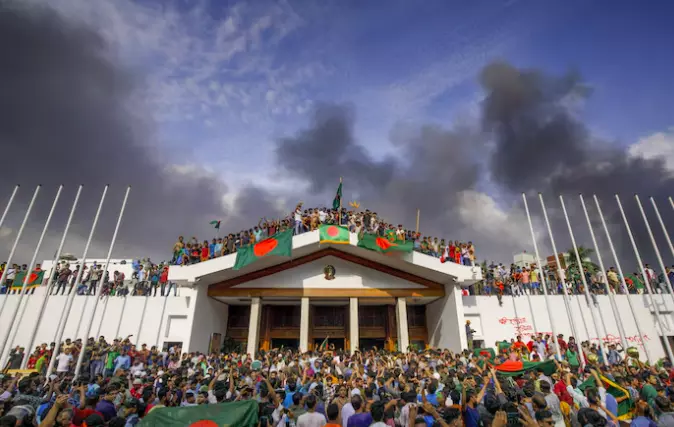Students Take Over Security Duties Amid Bangladesh Unrest

New Delhi: As reports of the targeting of minorities continue to emanate from Bangladesh in the absence of security forces, students have reportedly hit the streets yet again to maintain law and order. Reports in the Bangladesh media said while the police forces have gone missing from the streets of Dhaka and adjoining areas, students have taken on “security duties at various police stations, churches and temples”.
Bangladesh Nationalist Party acting chairman Tarique Rahman, son of former Prime Minister Khaleda Zia, in a video message at a party rally in Bangladesh, exhorted people to stop targeting the minorities and police personnel. In another recorded message, BNP chairperson Khaleda Zia said that she wanted “love and peace instead of destruction and revenge to rebuild the country”. Bangladesh Army chief Gen. Waker-Uz-Zaman told the Bangladeshi media that the situation would return to normal in a couple of days.
As an uneasy calm prevailed over riot-torn Bangladesh, the local media, students’ outfits and the intelligentsia have come down heavily on attacks on minority establishments across the country. There is also an uproar in Bangladesh’s media over the attack and plundering of one of the nation’s famous folk bands, “Joler Gaan”. The house of band leader Rahul Anand was set ablaze and plundered by arsonists and rioters on Tuesday. Rahul Anand, his wife Urmila Shukla and their 13-year-old son Tota managed to flee and were “hiding in a secret location”, Bangladeshi newspapers reported.
Coming out against attacks on the minorities in Bangladesh, Nahid Islam, a key organiser of the “Anti-Discriminatory Students Movement”, urged the people to remain peaceful and “take steps to protect government structures and the minorities”. Nahid claimed that the systematic attacks on the minorities were a “conspiracy to discredit the struggle”.
An opinion piece in Bangladeshi English daily Daily Star, condemning the targeting of minorities, asked: “What sufficient rationale can you provide that justifies attacking minority communities? What was their fault?” Lashing out against the arsonists and rioters the opinion piece warned: “Lakho shahid er rokte kena, deshta karo baper na” (The nation does not belong to anyone’s father or any particular group. Freedom was gained by the sacrifice of martyrs belonging to all faiths). It also condemned the vandalising of the statue of Sheikh Mujibir Rahman, father of the nation.
It wrote: “Let’s not forget that Bangabandhu (Mjuibir Rahman) was instrumental in our liberation war against the then Pakistani regime.” A local TV channel, News 24, and other visual media went on to telecast peace marches by the Bangladesh Nationalist Party (BNP).
As the police forces were going through a major overhaul, efforts were on to restore law and order in the country. Md Mainul Islam has been appointed as the inspector-general of police. The contractual appointment of Chowdhury Abdullah Al Mamun as IGP was cancelled on Tuesday. However, the Bangladesh TV channels continue to report that with police forces missing from Dhaka and adjoining areas, the students have taken on “security duties”.
A Bangladeshi newspaper Kaler Kontho reported that over the past couple of days at least 470 police stations were plundered and set ablaze. The Daily Star, in a news report published on Wednesday, said: “With many police stations unmanned and arms and ammunition looted, there is a sense of serious insecurity among people in the capital and elsewhere in the country.”
Panic seemed to have gripped police personnel after former Prime Minister Sheikh Hasina fled the country. A local news portal bdnews24.com reported: “To save their lives, many top police officials, along with other officers, have gone into hiding.”
The Bangladesh Police Association, which has profusely “apologized” to the students for “atrocities committed against protesters”, has requested the police personnel to return to duty. The police association, in a statement, “congratulated the revolutionaries” and “apologised for the injustices meted out to the students’ community”. Regretting the decision to open fire on protesters, the association blamed the Sheikh Hasina administration and stated: “Even though the police did not want to open fire, we were forced to do so to carry out the agenda of a political party.” The association further said “police personnel want to be part of society as they are also someone’s father, brother, sister and mother”. Later in the day, the earlier committee of the Bangladesh Police Association was dissolved and a new 39-member committee was formed.
